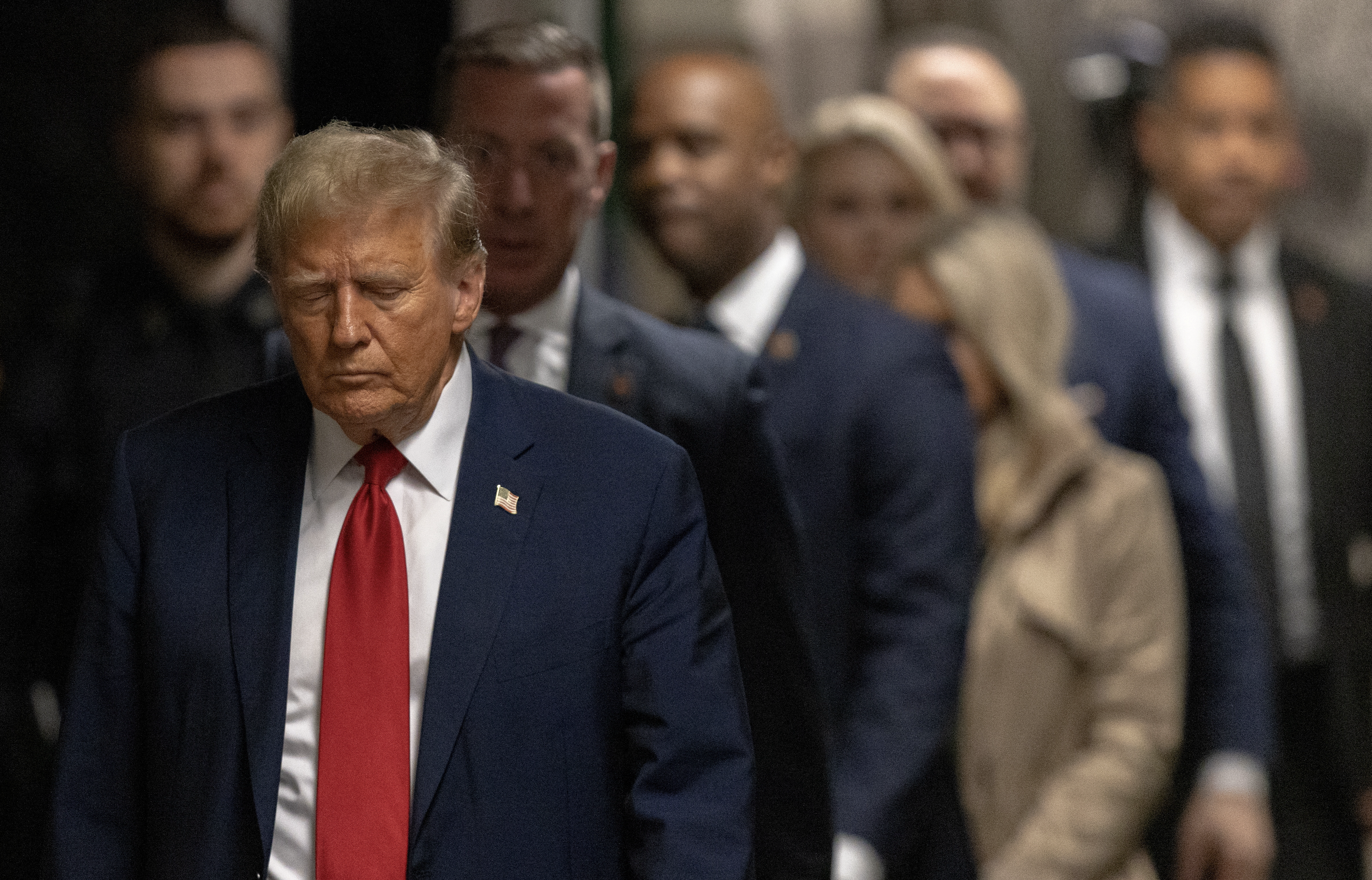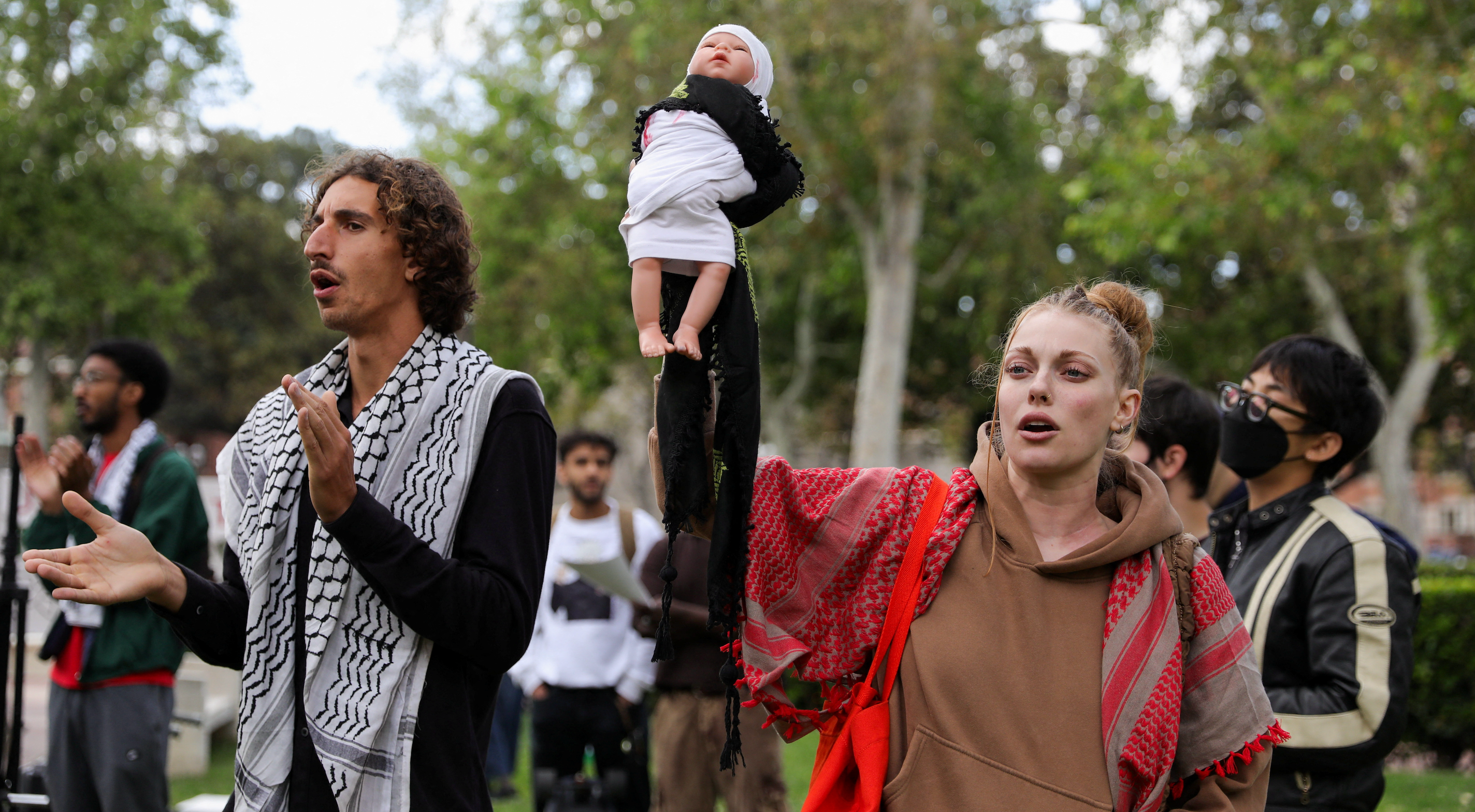
US Supreme Court presses Trump lawyer over immunity from prosecution
PHOTO CAPTION: Illustrative photo — Former US President Donald Trump arrives at Manhattan criminal court in New York, US, on Thursday, April 25, 2024. Trump faces 34 felony counts of falsifying business records as part of an alleged scheme to silence claims of extramarital sexual encounters during his 2016 presidential campaign. Jeenah Moon/Pool via REUTERS
By John Kruzel and Andrew Chung
WASHINGTON (Reuters) -U.S. Supreme Court justices on Thursday questioned a lawyer for Donald Trump about the former president's claim of immunity from prosecution for his efforts to overturn his 2020 election loss, posing questions about what happens if a president sells nuclear secrets, takes a bribe or orders a coup or assassination.
Trump appealed after lower courts rejected his request to be shielded from four election-related criminal charges on the grounds that he was serving as president when he took the actions that led to the indictment obtained by Special Counsel Jack Smith.
Trump, the Republican candidate challenging Democratic President Joe Biden in the Nov. 5 election, is the first former U.S. president to be criminally prosecuted.
"Without presidential immunity from criminal prosecution, there can be no presidency as we know it. For 234 years of American history, no president was ever prosecuted for his official acts," D. John Sauer, the lawyer arguing for Trump, told the justices.
"If a president can be charged, put on trial and imprisoned for his most controversial decisions as soon as he leaves office, that looming threat will distort the president's decision making precisely when bold and fearless action is most needed," Sauer added.
Michael Dreeben, representing the special counsel, told the justices that the Supreme Court has never recognized the kind of immunity that Trump seeks for a public official.
Liberal Justice Elena Kagan pressed Sauer on hypothetic scenarios to get his response on whether they would be an official act that would be immune from prosecution under Trump's claim.
"If a president sells nuclear secrets to a foreign adversary, was that immune?" Kagan asked.
Sauer responded that if it is "structured as an official act" the president could not be prosecuted unless he is first impeached and removed from office by Congress.
"How about if the president orders the military to stage a coup?" Kagan asked Sauer.
"That may well be an official act," Sauer responded, meaning no prosecution without impeachment and removal first.
Liberal Justice Sonia Sotomayor asked Sauer if a president could get immunity if he ordered "someone to assassinate" a political rival.
Conservative Justice John Roberts raised an example of a president appointing an ambassador in exchange for a bribe.
"Somebody says, 'I'll give you a million dollars if I'm made the ambassador to whatever," Roberts said.
Sauer responded that bribery is not an official act, but rather private conduct that would not be protected.
Roberts responded, "Accepting a bribe isn't an official act, but appointing an ambassador is certainly within the official responsibilities of the president."
Conservative Justice Samuel Alito asked Sauer whether "the very robust form of immunity" he was requesting was really necessary to protect "the proper functioning of the presidency" - or if something short of absolute immunity would suffice.
Conservative Justice Clarence Thomas asked Sauer what is the source of this presidential immunity. Sauer cited powers given to the president under the Constitution.
Trump has pleaded not guilty in this case and in three other criminal cases he faces, including an ongoing trial on New York state charges related to hush money paid to a porn star shortly before the 2016 U.S. election that put him in the White House. Trump did not attend the Supreme Court arguments because he was in a Manhattan courtroom in that case.
Sauer raised three hypothetical examples of past presidents being charged for officials actions taken as president.
He asked whether George W. Bush could be prosecuted for obstructing an official proceeding for allegedly lying to Congress to justify the Iraq war, or Barack Obama charged with murder for killing U.S. citizens abroad by drone strikes or Biden charged with unlawfully inducing immigrants to enter country illegally, based on his border policies.
"The answer to all these questions is no," Sauer said.
'A CEREMONIAL PRESIDENT'
On his way into court in New York, Trump told reporters, "A president has to have immunity. .... If you don't have immunity, you're not going to do anything. You're just going to become a ceremonial president."
The Supreme Court's 6-3 conservative majority includes three justices who Trump appointed: Amy Coney Barrett, Brett Kavanaugh and Neil Gorsuch.
The court already this year has handed Trump one major victory as he runs to regain the presidency. On March 4, it overturned a judicial decision that had excluded him from Colorado's ballot under a constitutional provision involving insurrection for inciting and supporting the Jan. 6, 2021, attack on the U.S. Capitol by his supporters.
Not since its landmark Bush v. Gore decision, which handed the disputed 2000 U.S. election to Republican George W. Bush over Democrat Al Gore, has the court played such an integral role in a presidential race.
Outside the white marble court building ahead of the arguments on a partly cloudy spring day in the U.S. capital, a small number of demonstrators displayed anti-Trump signs including one that read, "LOSER."
Trump took numerous steps to try to reverse his 2020 loss to Biden. His false claims of widespread voting fraud helped inspire the rampage at the Capitol on the day Congress met to certify Biden's victory, with his supporters attacking police and storming the building, sending lawmakers and others fleeing. Trump and his allies also devised a plan to use false electors from key states to thwart certification.
Kagan pressed Sauer on whether Trump's alleged role in assembling fake slates of electors constituted an "official act."
Sauer said Trump's conduct was official and amounted to acts aimed at ensuring the integrity of the election.
Kagan responded: "The allegation is that he was attempting to overthrow an election."
Liberal Justice Ketanji Brown Jackson asked Sauer about President Gerald Ford's pardon of Richard Nixon following Nixon's 1974 resignation. "If everybody thought that presidents couldn't be prosecuted, then what was that about?" Jackson asked.
The August 2023 indictment described Trump as "determined to remain in power" despite his election loss. Trump was charged with conspiring to defraud the United States, corruptly obstructing an official proceeding and conspiring to do so, and conspiring against the right of Americans to vote.
'ABSOLUTE IMMUNITY'
Trump's lawyers told the justices in a filing that a former president has "absolute immunity from criminal prosecution for his official acts."
Smith in a filing urged the justices to reject Trump's bid for immunity from prosecution on the principle that "no person is above the law."
Trump in October 2023 sought to have the charges dismissed based on his claim of immunity. U.S. District Judge Tanya Chutkan rejected that claim in December. Smith then asked the justices to launch a fast-track review of the immunity claim, a request they rebuffed. The U.S. Court of Appeals for the District of Columbia Circuit in February ruled 3-0 against Trump's appeal of Chutkan's ruling.
The Supreme Court's decision to put off hearing arguments over immunity until this month postponed Trump's trial, which had been scheduled to start in March. Legal experts have said the justices would need to rule by about June 1 for Trump's trial to be held before the election.
A ruling is expected no later than the end of June, which could force Chutkan to decide whether to begin a trial in September or October, when early voting already will be underway in some states.
If Trump regains the presidency, he could seek to force an end to the prosecution or potentially pardon himself for any federal crimes.
Trump also faces election subversion charges in state court in Georgia and federal charges in Florida brought by Smith relating to keeping classified documents after leaving office.
(Reporting by John Kruzel and Andrew Chung; Additional reporting by Andrew Goudsward; Editing by Will Dunham and Scott Malone)









